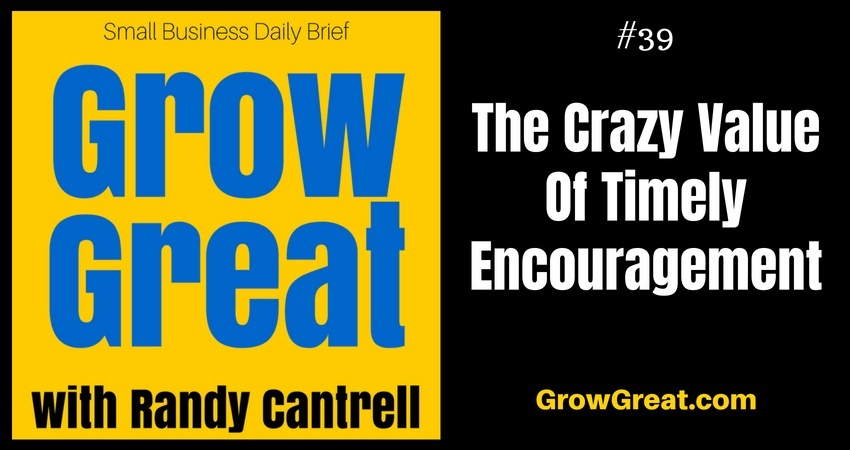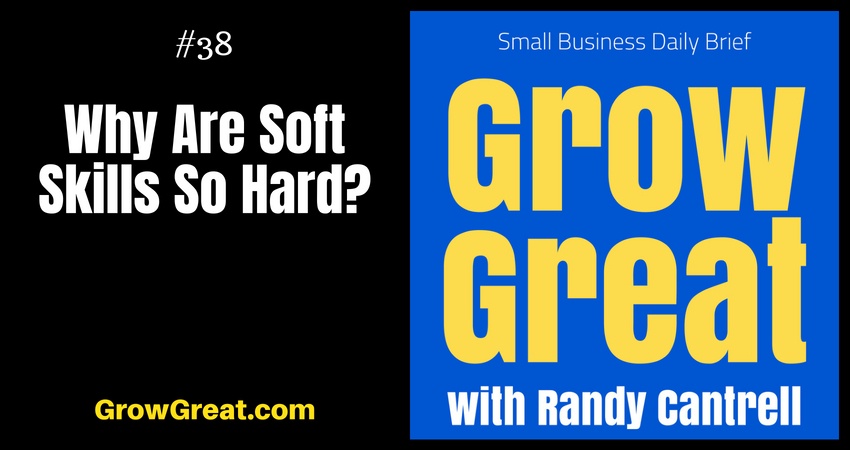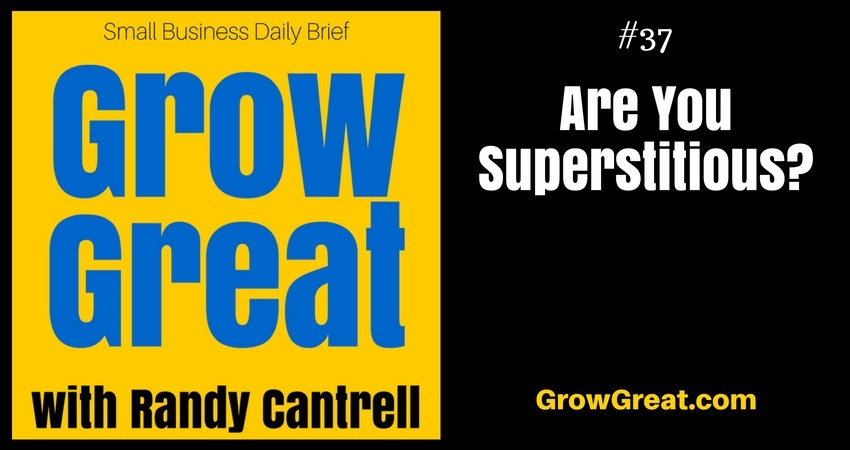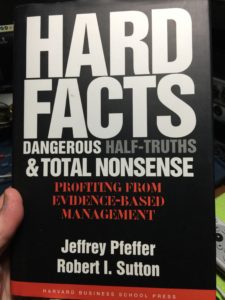The Crazy Value Of Timely Encouragement – Grow Great Small Business Daily Brief #39 – July 17, 2018
Podcast: Play in new window | Download (Duration: 9:30 — 9.8MB)
Subscribe: Apple Podcasts | Spotify | RSS | More

Watch or read almost any biography of high achievers and you’re going to hear a story of somebody in their life who expressed extraordinary confidence in them. And not the stereotypical parents who tell their child, “You can do this.” Something more precise. More powerful.
John McEnroe was recently on Joe Buck’s TV show, Undeniable With Joe Buck. As a teenager, a reporter saw him play and wrote that within 5 years he’d be the number 1 player. Here was somebody, not a close friend or family, who saw something McEnroe admitted he didn’t even see in himself. But you can tell it fueled within him possibilities he may have not fully understood. It speaks to the power of somebody else believing in us.
I’m not discounting generic parental encouragement. But…there’s something remarkable about somebody else – a person who we know has a different perspective – perhaps a person we know is more objective (or more of an expert), encourages us. Directly or indirectly. McEnroe was encouraged not by what was said to him, but what was said about him.
The “who,” the “what” and the “when” of the encouragement matter.
Think about your own life. Reflect on the people who have served you in one way or another. Was there something somebody said about you that made a major impact on you?
Who were they? What did they say? When did they say it?
All three matter.
Who. We’ve all learned the truth of the phrase, “Consider the source.” We most often use it whenever we’re talking somebody off the ledge about some unjust criticism they feel they’ve suffered. We listen. We console them and we say, “Consider the source.” Meaning, their opinion doesn’t matter.
Sometimes people get lots of compliments and encouragements, but there’s somebody they’re not getting it from. Somebody who’s encouragement would mean more than all the others combined. I’ve seen it all my life. Especially among younger people who have an older mentor not as forthcoming with praise as peers. Now that I’m older, I have a clear understanding of it. I don’t necessarily have a clear knowledge of how to best execute it, but I’ve got some ideas.
The older mentor sees all the praise and adoration lavished on the young person and fears too much will create a swelled head. As you grow older it’s easy to understand because through the years we’ve seen it happen. Somebody with excellent skills receives many compliments. We can feel like we’re throwing gasoline on a fire that won’t serve them well. Instead, we fear it will make them overly confident, even arrogant. I’ve seen it happen many, many times. So I get it. I understand the reluctance.
The source of the encouragement determines the weight of it. When a mom tells her daughter what a great singer she is, that’s cool. But when Simon Cowell tells her, that’s epic. He’s an expert. Mom can’t really help her daughter’s career by recognizing her talent. Simon can. Because what Simon says matters more.
What is said matters. McEnroe read that a tennis reporter declared he’d be number 1. It seems John didn’t think of himself at a scale that large. It’s hard to separate the what from the when. At least in John’s case. When this was said he hadn’t yet formed the dream to be great at that scale. Perhaps that remark fired within him the determination that he could compete at the highest levels possible. Not merely being an NCAA champion. Or a regional Queens New York phenom.
The specifics matter. Simon Cowell can tell the girl she’s got a pretty voice, but she won’t ever make a living singing. That’s not the same as telling her she’s spectacular and she’ll be advancing on the show. What he says and what he doesn’t say matter to her.
When is our third major component. When the girl is trying to make it onto a TV talent show with Simon Cowell, she needs confidence if she’s got real talent. She’s likely on a stage this size for the first time. She’s inexperienced. Without much knowledge, if she’s got the right stuff or not. Thinking you do isn’t the same as hearing somebody who knows more than you express their belief in you. At this moment, what Simon says matters. Timing matters. To us. When it’s about us.
Let’s go back to your life and your memory of somebody with high credibility who encouraged you. Be detailed in your recall of it. Who was it? What exactly did they say? When did they say it? Think for a few minutes about the power of it. Maybe it was so pivotal it made all the difference in the world. Maybe it was more subtle but just as powerful. No matter, it was outside expert confirmation that you were able. That expression of belief in you was critical.
Now, here’s the real point of today’s show. Your leadership. Your influence. Your power. Your encouragement.
Recognition is a big deal, but that’s more reward. This is encouragement. This is the expression of belief in something not yet fully realized. It’s not the reward for having already accomplished it. It’s encouragement for the person to keep pressing in order to achieve the accomplishment.
Look around. Do you have people in your sphere of leadership who show signs of true greatness? You see something in them – some capacity – that you’re unsure they see in themselves. Don’t sit on that belief. Share it with them. Do that however suits you best. Yes, you guessed it – you’ll figure it out.
You’re not off the hook with the exclamation that you’re just not that type of leader. If you can’t encourage, you can’t lead. Period. Leadership is serving people. People need and deserve encouragement. It’s been said that great leaders see the future first. Let’s apply that to the people in your life. What future do you see in them? Is it bright? Do you see a potential that’s not yet realized? Then say so. Share it. Be specific about what you see. Be specific about how they might be able to achieve it, and what you’re willing to do to help them.
I hear these stories of high achievers like John McEnroe who got some encouragement out of the blue at the right time and I wonder what might have happened if it had never happened. The fact that somebody saw him being the number 1 player propelled him toward believing it was possible. What if you sit on that encouragement and it never happens? They might not pursue it. They might give up. They may never achieve the things they could. All because you’re reluctant to encourage them in a timely, fitting, specific and appropriate way. Be the encouraging leader. Few things will provide a higher ROI to that person. Their success is your success.
Be well. Do good. Grow great!





 Some years ago (March 2006) a couple of my favorite business authors – Jeffrey Pfeffer and Robert Sutton – wrote a book entitled, “HARD FACTS, DANGEROUS HALF-TRUTHS AND TOTAL NONSENSE: Profiting from Evidence-Based Management.” Most of us claim to be fond of evidence-based management and leadership. And we claim to practice it. But do we really?
Some years ago (March 2006) a couple of my favorite business authors – Jeffrey Pfeffer and Robert Sutton – wrote a book entitled, “HARD FACTS, DANGEROUS HALF-TRUTHS AND TOTAL NONSENSE: Profiting from Evidence-Based Management.” Most of us claim to be fond of evidence-based management and leadership. And we claim to practice it. But do we really? 


